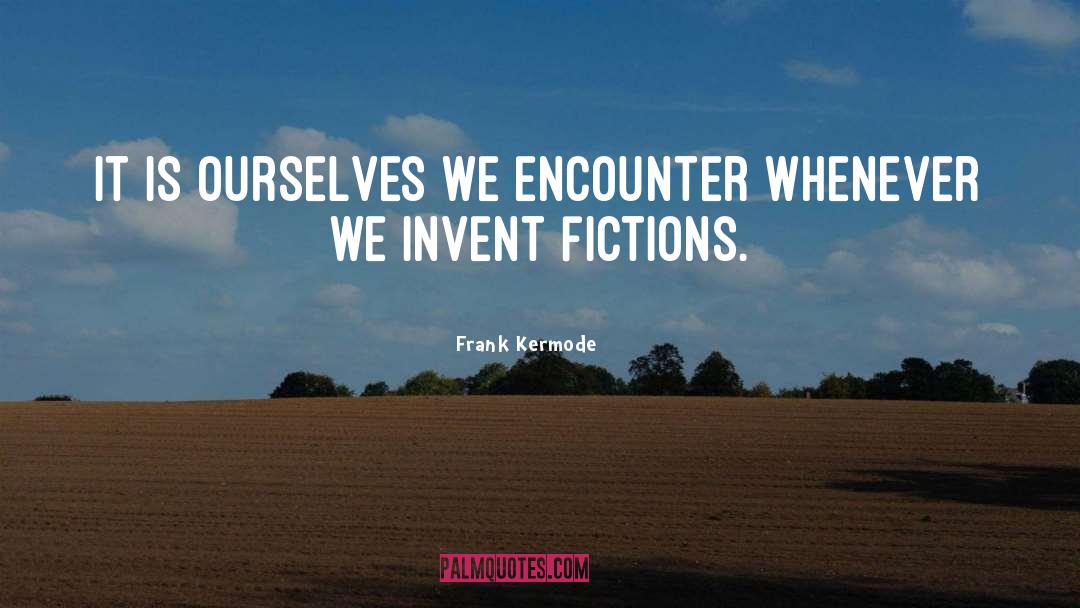Frank Kermode Famous Quotes
Reading Frank Kermode quotes, download and share images of famous quotes by Frank Kermode. Righ click to see or save pictures of Frank Kermode quotes that you can use as your wallpaper for free.
The first phase of modernism, which so far as the English language goes we associate with Pound and Yeats, Wyndham Lewis and Eliot and Joyce, was clerkly enough, sceptical in many ways; and yet we can without difficulty convict most of these authors of dangerous lapses into mythical thinking. All were men of critical temper, haters of the decadence of the times and the myths of mauvaise foi. All, in different ways, venerated tradition and had programmes which were at once modern and anti-schismatic. This critical temper was admittedly made to seem consistent with a strong feeling for renovation; the mood was eschatological, but scepticism and a refined traditionalism held in check what threatened to be a bad case of literary primitivism. It was elsewhere that the myths ran riot.
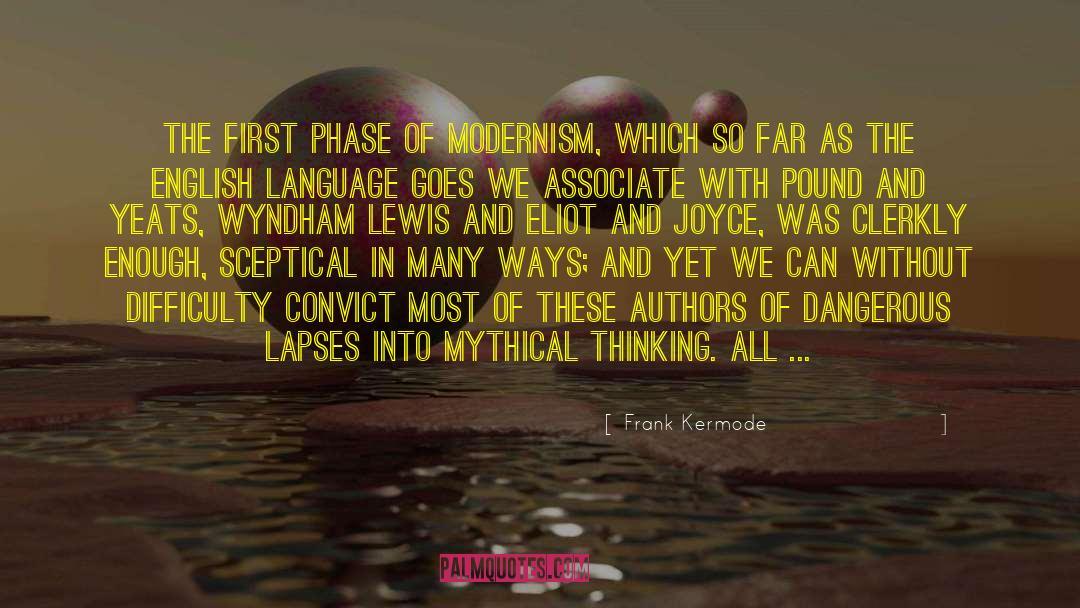
But that there is a simple relation between literary and other fictions seems, if one attends to it, more obvious than has appeared. If we think first of modern fictions, it can hardly be an accident that ever since Nietzsche generalized and developed the Kantian insights, literature has increasingly asserted its right to an arbitrary and private choice of fictional norms, just as historiography has become a discipline more devious and dubious because of our recognition that its methods depend to an unsuspected degree on myths and fictions. After Nietzsche it was possible to say, as Stevens did, that 'the final belief must be in a fiction.' This poet, to whom the whole question was of perpetual interest, saw that to think in this way was to postpone the End--when the fiction might be said to coincide with reality--for ever; to make of it a fiction, an imaginary moment when 'at last' the world of fact and the mundo of fiction shall be one. Such a fiction--the last section of Notes toward a Supreme Fiction is, appropriately, the place where Stevens gives it his fullest attention--such a fiction of the end is like infinity plus one and imaginary numbers in mathematics, something we know does not exist, but which helps us to make sense of and to move in the world. Mundo is itself such a fiction. I think Stevens, who certainly thought we have to make our sense out of whatever materials we find to hand, borrowed it from Ortega. His general doctrine of fictions he took from Vaihinge
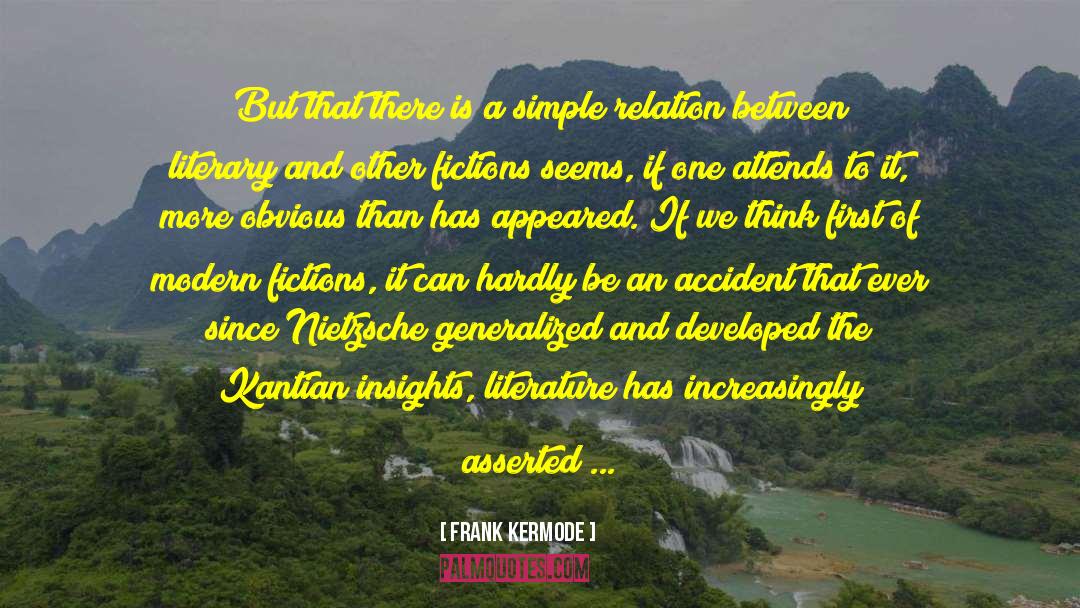
here is one other element of the apocalyptic tradition to be considered, namely transition. I said a minute ago that one of the assumptions prevalent in sophisticated apocalyptism was what Yeats called 'antithetical multiform influx'--the forms assumed by the inrushing gyre as the old one reaches its term. The dialectic of Yeats's gyres is simple enough in essence; they are a figure for the co-existence of the past and future at the time of transition. The old narrows to its apex, the new broadens towards its base, and the old and new interpenetrate. Where apex and base come together you have an age of very rapid transition. Actually, on Yeats's view of the historical cycle, there were transient moments of perfection, or what he called Unity of Being; but there was no way of making these permanent, and his philosophy of history is throughout transitional. In this he is not, of course, original; but his emphasis on the traditional character of our own pre-apocalyptic moment, in contrast with those exquisite points of time when life was like the water brimming beautifully but unstably over the rim of a fountain, seems, for all the privacy of the expression, characteristically modern.
It is commonplace that our times do in fact suffer a more rapid rate of change technologically, and consequently in the increase of social mobility, than any before us. There is nothing fictive about that, and its implications are clear in our own day-to-day lives. What is interesting, t
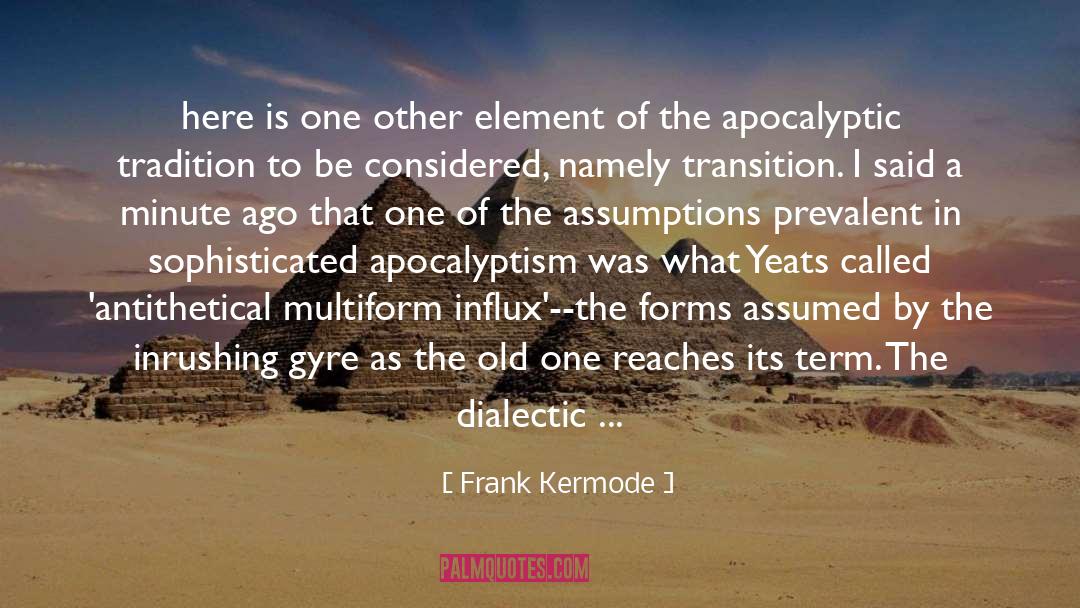
Novels, says Sartre, are not life, but they owe our power upon us, as upon himself as an infant, to the fact that they are somehow like life. In life, he once remarked, 'all ways are barred and nevertheless we must act. So we try to change the world; that is, to live as if the relations between things and their potentialities were governed not by deterministic processes but by magic.' The as if of the novel consists in a similar negation of determinism, the establishment of an accepted freedom by magic. We make up aventures, invent and ascribe the significance of temporal concords to those 'privileged moments' to which we alone award their prestige, make our own human clocks tick in a clockless world. And we take a man who is by definition de trop, and create a context in which he isn't.
The novel is a lie only as our quotidian inventions are lies. The power which goes to its making--the imagination --is a function of man's inescapable freedom. This freedom, in Mary Warnock's words, 'expresses itself in his ability to see things which are not.' It is by his fiction that we know he is free. It is not surprising that Sartre as ontologist, having to describe many kinds of fictive behaviour, invents stories to do so, thus moving into a middle ground between life and novel. ....
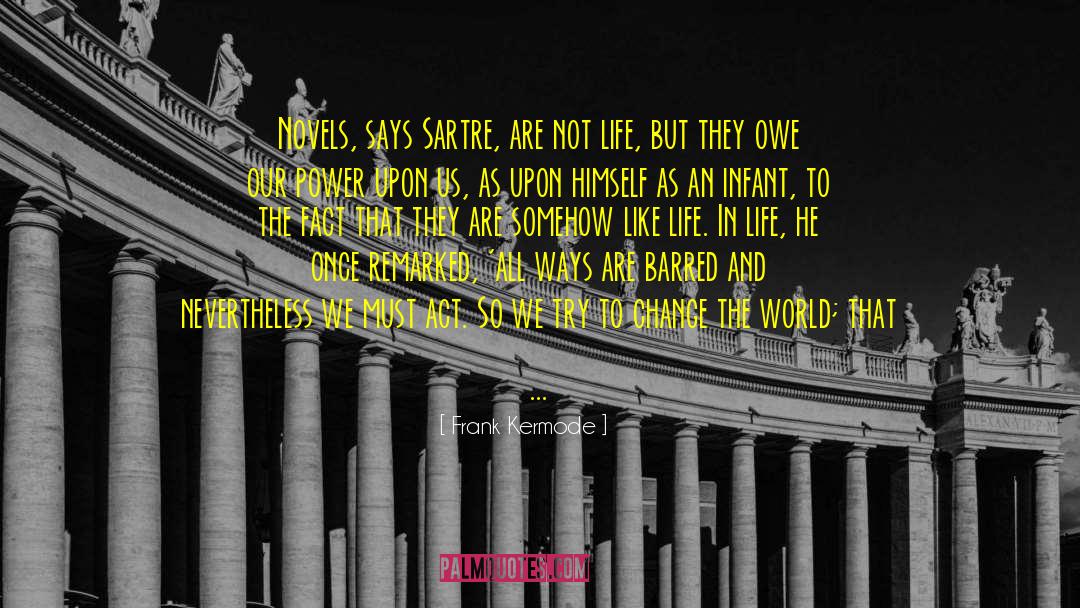
The history of interpretation, the skills by which we keep alive in our minds the light and dark of past literature and past humanity ... is to an incalculable extent a history of error.
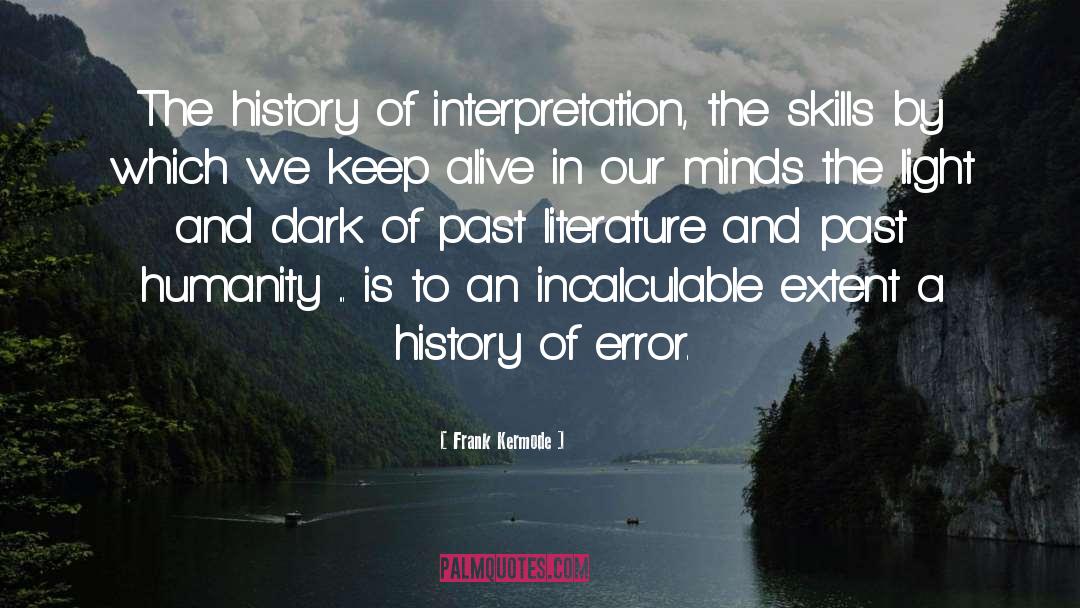
I have used the theologians and their treatment of apocalypse as a model of what we might expect to find not only in more literary treatments of the same radical fiction, but in the literary treatment of radical fictions in general. The assumptions I have made in doing so I shall try to examine next time. Meanwhile it may be useful to have some kind of summary account of what I've been saying. The main object: is the critical business of making sense of some of the radical ways of making sense of the world. Apocalypse and the related themes are strikingly long-lived; and that is the first thing to say tbout them, although the second is that they change. The Johannine acquires the characteristics of the Sibylline Apocalypse, and develops other subsidiary fictions which, in the course of time, change the laws we prescribe to nature, and specifically to time. Men of all kinds act, as well as reflect, as if this apparently random collocation of opinion and predictions were true. When it appears that it cannot be so, they act as if it were true in a different sense. Had it been otherwise, Virgil could not have been altissimo poeta in a Christian tradition; the Knight Faithful and True could not have appeared in the opening stanzas of "The Faerie Queene". And what is far more puzzling, the City of Apocalypse could not have appeared as a modern Babylon, together with the 'shipmen and merchants who were made rich by her' and by the 'inexplicable splendour' of her 'fine linen, and pur
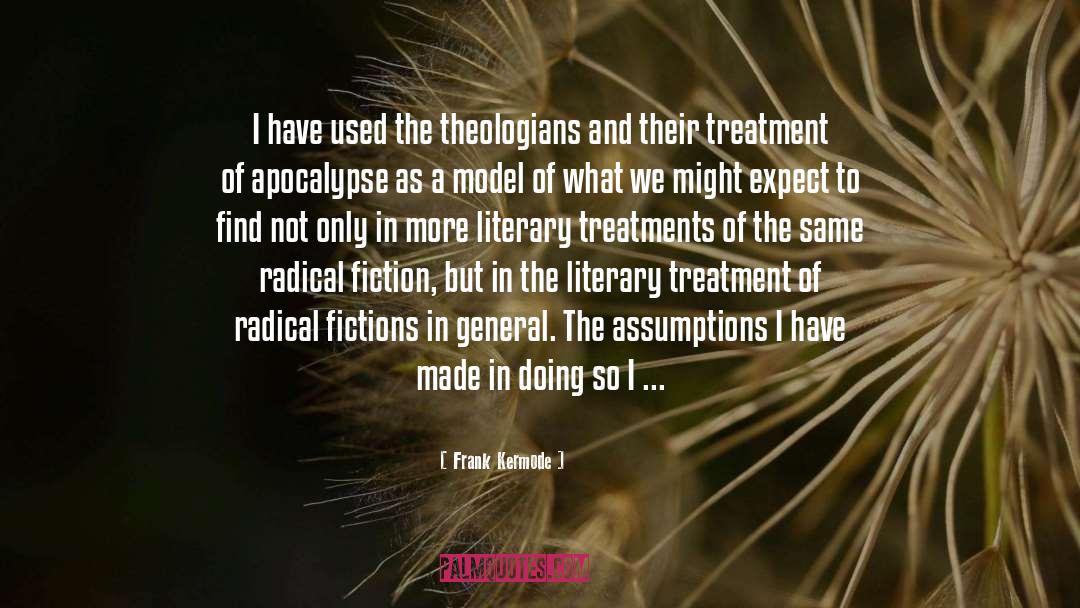
The degree of rigidity is a matter of profound interest in the study of literary fictions. As an extreme case you will find some novel, probably contemporary with yourself, in which the departure from a basic paradigm, the peripeteia in the sense I am now giving it, seems to begin with the first sentence. The schematic expectations of the reader are discouraged immediately. Since by definition one seeks the maximum peripeteia (in this extended sense) in the fiction of one's own time, the best instance I can give is from Alain Robbe-Grillet. He refuses to speak of his 'theory' of the novel; it is the old ones who talk about the need for plot, character, and so forth, who have the theories. And without them one can achieve a new realism, and a narrative in which 'le temps se trouve coupé de la temporalité. Il ne coule plus.' And so we have a novel in which,. the reader will find none of the gratification to be had from sham temporality, sham causality, falsely certain description, clear story. The new novel 'repeats itself, bisects itself, modifies itself, contradicts itself, without even accumulating enough bulk to constitute a past--and thus a "story," in the traditional sense of the word.' The reader is not offered easy satisfactions, but a challenge to creative co-operation.
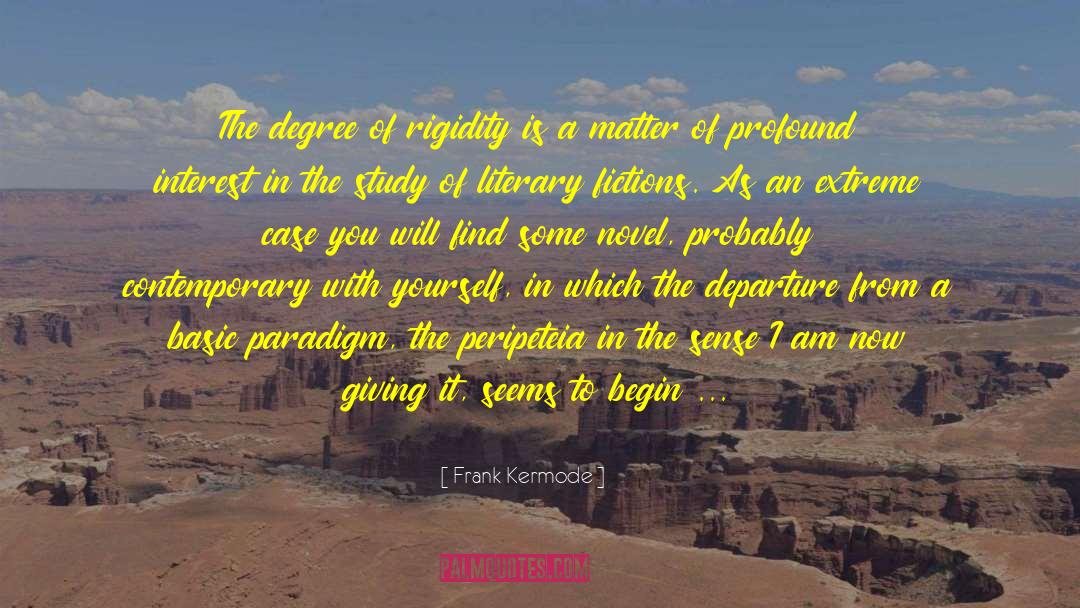
You sometimes hear people say, with a certain pride in their clerical resistance to the myth, that the nineteenth century really ended not in 1900 but in 1914. But there are different ways of measuring an epoch. 1914 has obvious qualifications; but if you wanted to defend the neater, more mythical date, you could do very well. In 1900 Nietzsche died; Freud published The Interpretation of Dreams; 1900 was the date of Husserl Logic, and of Russell's Critical Exposition of the Philosophy of Leibniz. With an exquisite sense of timing Planck published his quantum hypothesis in the very last days of the century, December 1900. Thus, within a few months, were published works which transformed or transvalued spirituality, the relation of language to knowing, and the very locus of human uncertainty, henceforth to be thought of not as an imperfection of the human apparatus but part of the nature of things, a condition of what we may know. 1900, like 1400 and 1600 and 1000, has the look of a year that ends a saeculum. The mood of fin de siècle is confronted by a harsh historical finis saeculi. There is something satisfying about it, some confirmation of the rightness of the patterns we impose. But as Focillon observed, the anxiety reflected by the fin de siècle is perpetual, and people don't wait for centuries to end before they express it. Any date can be justified on some calculation or other.
And of course we have it now, the sense of an ending. It has not diminished, and
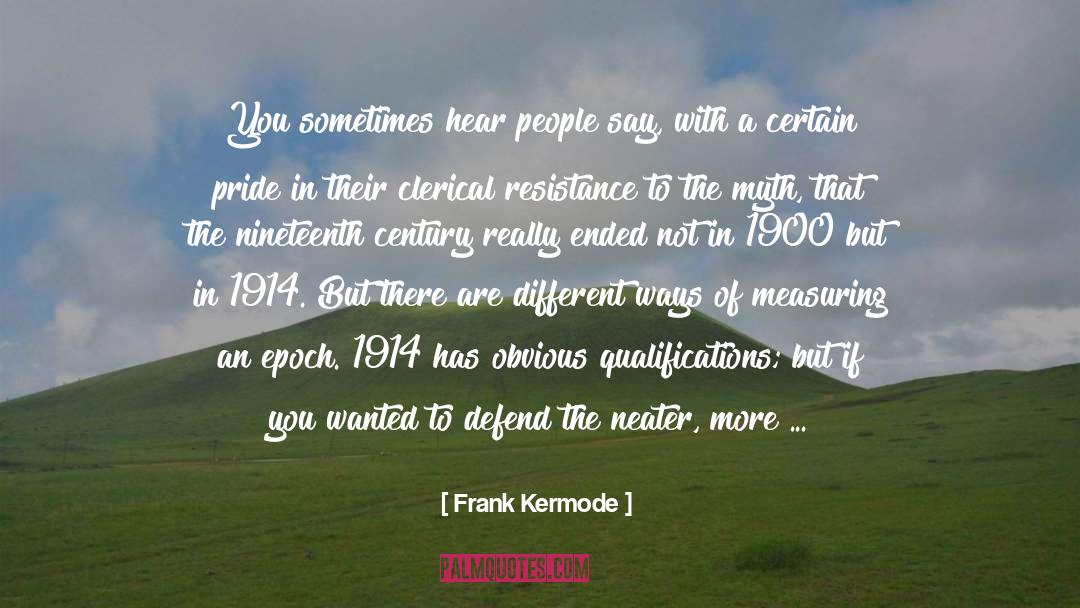
What Kant took to be the necessary schemata of reality,' says a modern Freudian, 'are really only the necessary schemata of repression.' And an experimental psychologist adds that 'a sense of time can only exist where there is submission to reality.' To see everything as out of mere succession is to behave like a man drugged or insane. Literature and history, as we know them, are not like that; they must submit, be repressed. It is characteristic of the stage we are now at, I think, that the question of how far this submission ought to go--or, to put it the other way, how far one may cultivate fictional patterns or paradigms--is one which is debated, under various forms, by existentialist philosophers, by novelists and anti-novelists, by all who condemn the myths of historiography. It is a debate of fundamental interest, I think, and I shall discuss it in my fifth talk.
Certainly, it seems, there must, even when we have achieved a modern degree of clerical scepticism, be some submission to the fictive patterns. For one thing, a systematic submission of this kind is almost another way of describing what we call 'form.' 'An inter-connexion of parts all mutually implied'; a duration (rather than a space) organizing the moment in terms of the end, giving meaning to the interval between tick and tock because we humanly do not want it to be an indeterminate interval between the tick of birth and the tock of death. That is a way of speaking in temporal terms of literary f
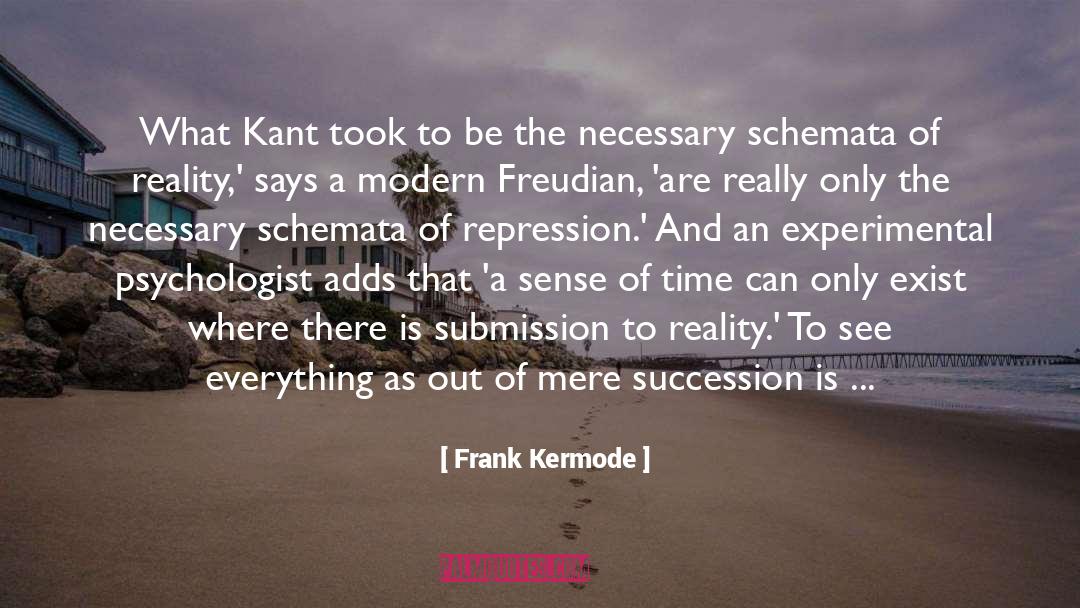
A sixteenth-century poet, especially one who knew that he ought to be a curious and universal scholar, would possess some notions, perhaps not strictly philosophical, about the origin of the world and its end, the eduction of forms from matter, and the relation of such forms to the higher forms which are the model of the world and have their being in the mind of God. He might well be a poet to brood on those great complementary opposites: the earthly and heavenly cities, unity and multiplicity, light and dark, equity and justice, continuity--as triumphantly exhibited in his own Empress--and ends--as sadly exhibited in his own Empress. Like St. Augustine he will see mutability as the condition of all created things, which are immersed in time. Time, he knows, will have a stop--perhaps, on some of the evidence, quite soon. Yet there is other evidence to suggest that this is not so. It will seem to him, at any rate, that his poem should in part rest on some poetic generalization-some fiction--which reconciles these opposites, and helps to make sense of the discords, ethical, political, legal, and so forth, which, in its completeness, it had to contain.
This may stand as a rough account of Spenser's mood when he worked out the sections of his poem which treat of the Garden of Adonis and the trial of Mutability, the first dealing with the sempiternity of earthly forms, and the second with the dilation of being in these forms under the shadow of a final end. Perhaps the
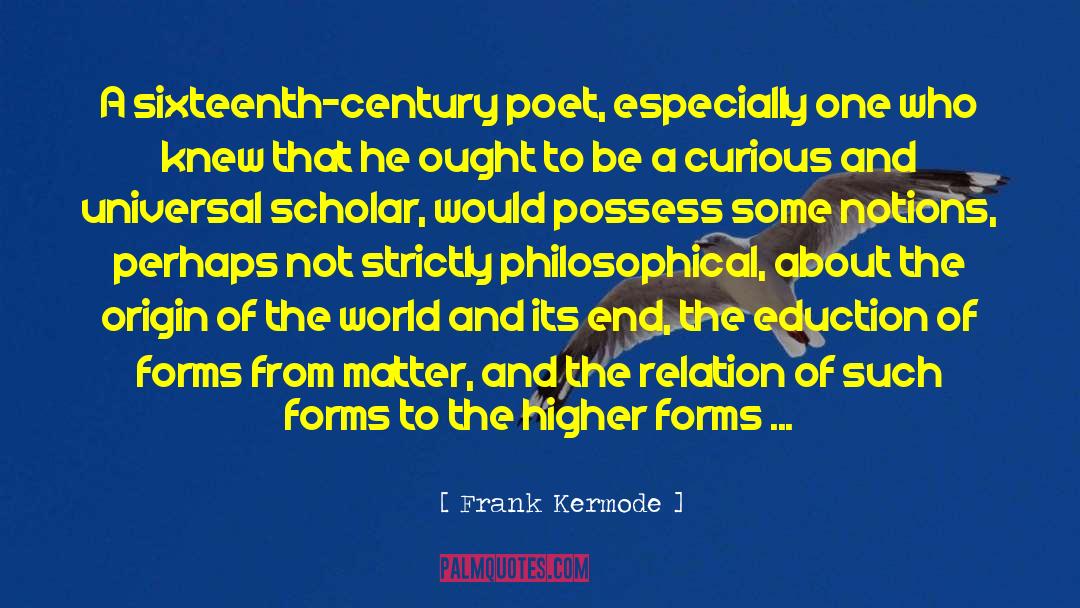
What, then, can Shakespearean tragedy, on this brief view, tell us about human time in an eternal world? It offers imagery of crisis, of futures equivocally offered, by prediction and by action, as actualities; as a confrontation of human time with other orders, and the disastrous attempt to impose limited designs upon the time of the world. What emerges from Hamlet is--after much futile, illusory action--the need of patience and readiness. The 'bloody period' of Othello is the end of a life ruined by unseasonable curiosity. The millennial ending of Macbeth, the broken apocalypse of Lear, are false endings, human periods in an eternal world. They are researches into death in an age too late for apocalypse, too critical for prophecy; an age more aware that its fictions are themselves models of the human design on the world. But it was still an age which felt the human need for ends consonant with the past, the kind of end Othello tries to achieve by his final speech; complete, concordant. As usual, Shakespeare allows him his tock; but he will not pretend that the clock does not go forward. The human perpetuity which Spenser set against our imagery of the end is represented here also by the kingly announcements of Malcolm, the election of Fortinbras, the bleak resolution of Edgar.
In apocalypse there are two orders of time, and the earthly runs to a stop; the cry of woe to the inhabitants of the earth means the end of their time; henceforth 'time shall be no more.' I
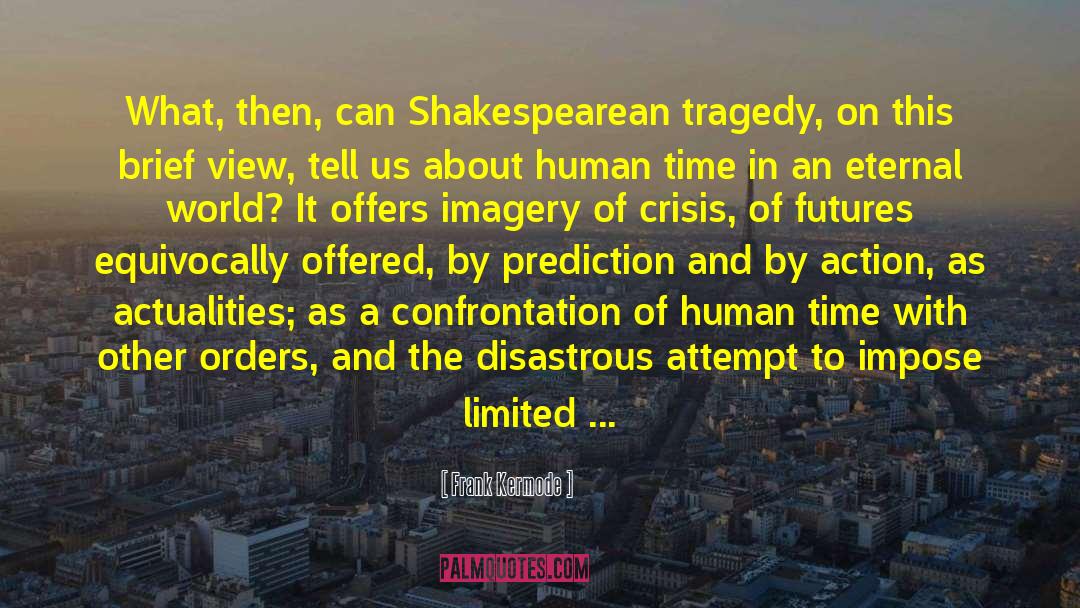
For Aristotle the literary plot was analogous to the plot of the world in that both were eductions from the potency of matter. Sartre denies this for the world, and specifically denies, in the passage just referred to, that without potentiality there is no change. He reverts to the Megaric view of the matter, which Aristotle took such trouble to correct. But this is not our affair. The fact is that even if you believe in a Megaric world there is no such thing as a Megaric novel; not even Paterson. Change without potentiality in a novel is impossible, quite simply; though it is the hopeless aim of the cut-out writers, and the card-shuffle writers. A novel which really implemented this policy would properly be a chaos. No novel can avoid being in some sense what Aristotle calls 'a completed action.' This being so, all novels imitate a world of potentiality, even if this implies a philosophy disclaimed by their authors. They have a fixation on the eidetic imagery of beginning, middle, and end, potency and cause.
Novels, then, have beginnings, ends, and potentiality, even if the world has not. In the same way it can be said that whereas there may be, in the world, no such thing as character, since a man is what he does and chooses freely what he does--and in so far as he claims that his acts are determined by psychological or other predisposition he is a fraud, lâche, or salaud--in the novel there can be no just representation of this, for if the man were entirely free
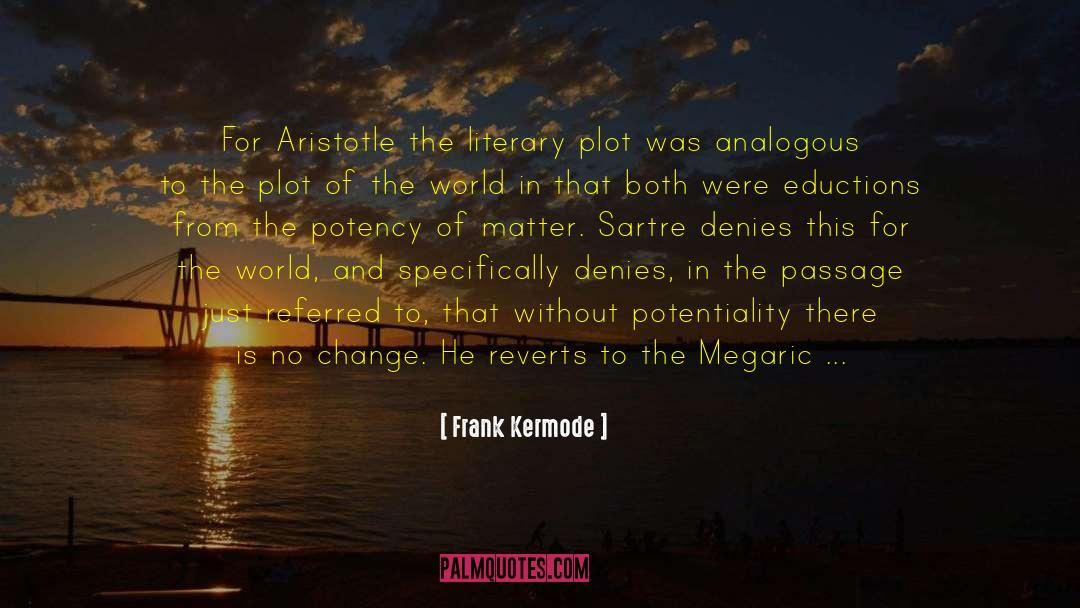
When tragedy established itself in England it did so in terms of plots and spectacle that had much more to do with medieval apocalypse than with the mythos and opsis of Aristotle. Later, tragedy itself succumbs to the pressure of 'demythologizing'; the End itself, in modern literary plotting loses its downbeat, tonic-and-dominant finality, and we think of it, as the theologians think of Apocalypse, as immanent rather than imminent. Thus, as we shall see, we think in terms of crisis rather than temporal ends; and make much of subtle disconfirmation and elaborate peripeteia. And we concern ourselves with the conflict between the deterministic pattern any plot suggests, and the freedom of persons within that plot to choose and so to alter the structure, the relation of beginning, middle, and end.
Naïvely predictive apocalypses implied a strict concordance between beginning, middle, and end. Thus the opening of the seals had to correspond to recorded historical events. Such a concordance remains a deeply desired object, but it is hard to achieve when the beginning is lost in the dark backward and abysm of time, and the end is known to be unpredictable. This changes our views of the patterns of time, and in so far as our plots honour the increased complexity of these ways of making sense, it complicates them also. If we ask for comfort from our plots it will be a more difficult comfort than that which the archangel offered Adam:
How soon hath thy prediction,
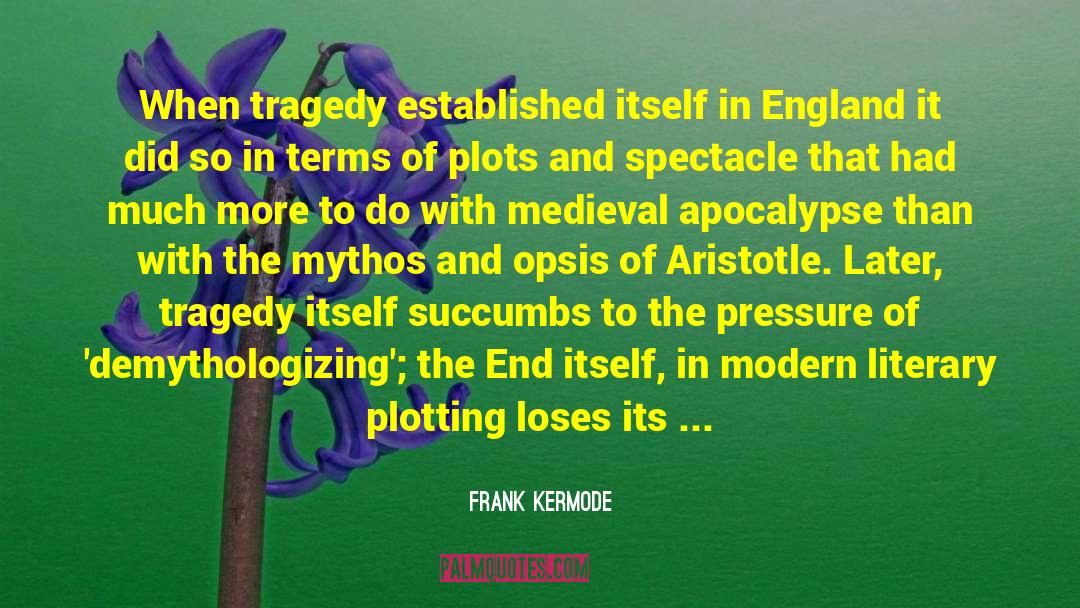
It is already the fashion to diminish Eliot by calling him derivative, the mouthpiece of Pound, and so forth; and yet if one wanted to understand the apocalypse of early modernism in its true complexity it would be Eliot, I fancy, who would demand one's closest attention. He was ready to rewrite the history of all that interested him in order to have past and present conform; he was a poet of apocalypse, of the last days and the renovation, the destruction of the earthly city as a chastisement of human presumption, but also of empire. Tradition, a word we especially associate with this modernist, is for him the continuity of imperial deposits; hence the importance in his thought of Virgil and Dante. He saw his age as a long transition through which the elect must live, redeeming the time. He had his demonic host, too; the word 'Jew' remained in lower case through all the editions of the poems until the last of his lifetime, the seventy-fifth birthday edition of 1963. He had a persistent nostalgia for closed, immobile hierarchical societies. If tradition is, as he said in After Strange Gods--though the work was suppressed--'the habitual actions, habits and customs' which represent the kinship 'of the same people living in the same place' it is clear that Jews do not have it, but also that practically nobody now does. It is a fiction, a fiction cousin to a myth which had its effect in more practical politics. In extenuation it might be said that these writers felt, as Sartre fe
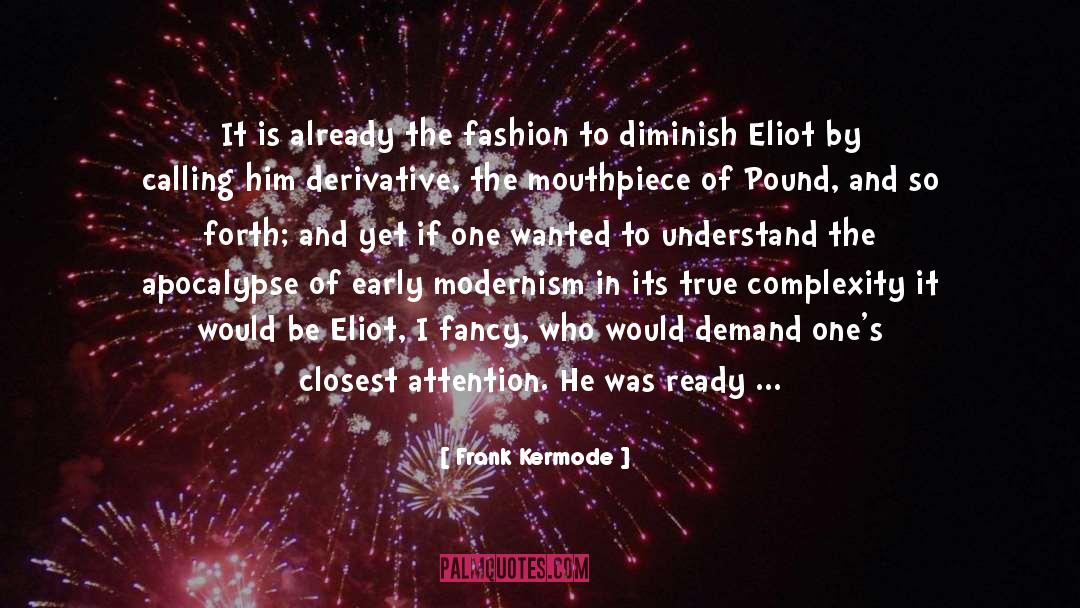
Having compared the novel-reader with an infant and a primitive, one can go further and call him a psychopath; and this I shall shortly be doing.
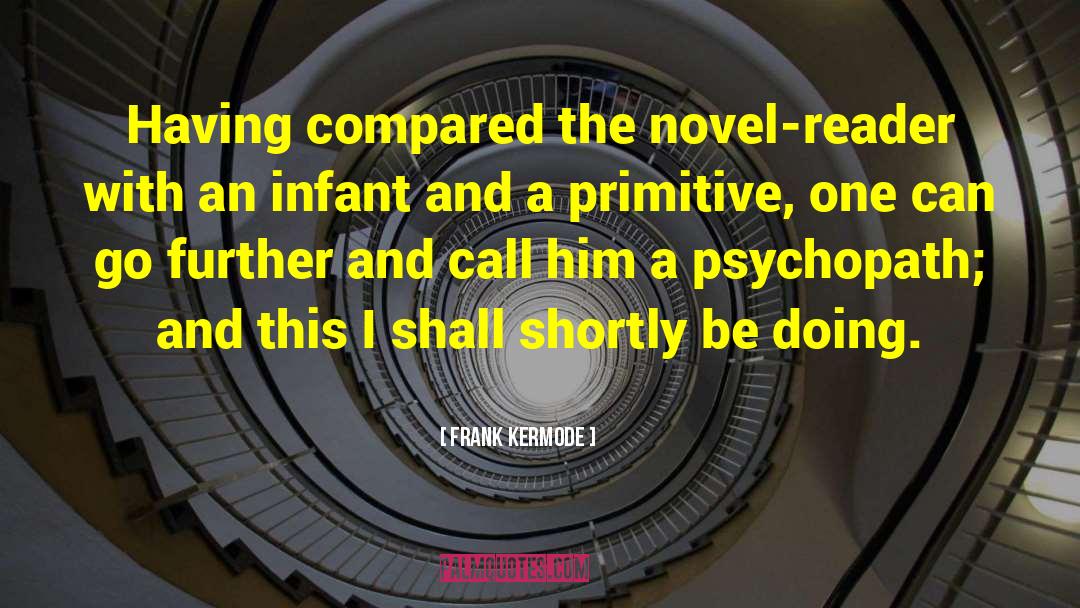
It might be useful here to say a word about Beckett, as a link between the two stages, and as illustrating the shift towards schism. He wrote for transition, an apocalyptic magazine (renovation out of decadence, a Joachite indication in the title), and has often shown a flair for apocalyptic variations, the funniest of which is the frustrated millennialism of the Lynch family in Watt, and the most telling, perhaps, the conclusion of Comment c'est. He is the perverse theologian of a world which has suffered a Fall, experienced an Incarnation which changes all relations of past, present, and future, but which will not be redeemed. Time is an endless transition from one condition of misery to another, 'a passion without form or stations,' to be ended by no parousia. It is a world crying out for forms and stations, and for apocalypse; all it gets is vain temporality, mad, multiform antithetical influx.
It would be wrong to think that the negatives of Beckett are a denial of the paradigm in favour of reality in all its poverty. In Proust, whom Beckett so admires, the order, the forms of the passion, all derive from the last book; they are positive. In Beckett, the signs of order and form are more or less continuously presented, but always with a sign of cancellation; they are resources not to be believed in, cheques which will bounce. Order, the Christian paradigm, he suggests, is no longer usable except as an irony; that is why the Rooneys collapse in laughter when the
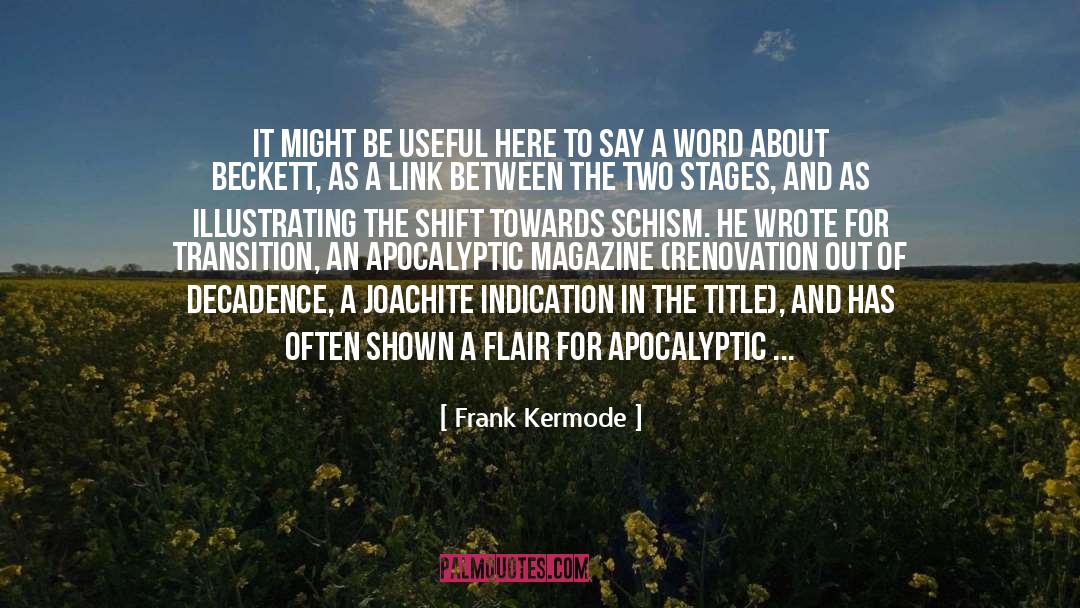
We are all poor; but there is a difference between what Mrs. Spark intends by speaking of 'slender means', and what Stevens called our poverty or Sartre our need, besoin. The poet finds his brief, fortuitous concords, it is true: not merely 'what will suffice,' but 'the freshness of transformation,' the 'reality of decreation,' the 'gaiety of language.' The novelist accepts need, the difficulty of relating one's fictions to what one knows about the nature of reality, as his donnée.
It is because no one has said more about this situation, or given such an idea of its complexity, that I want to devote most of this talk to Sartre and the most relevant of his novels, La Nausée. As things go now it isn't of course very modern; Robbe-Grillet treats it with amused reverence as a valuable antique. But it will still serve for my purposes. This book is doubtless very well known to you; I can't undertake to tell you much about it, especially as it has often been regarded as standing in an unusually close relation to a body of philosophy which I am incompetent to expound. Perhaps you will be charitable if I explain that I shall be using it and other works of Sartre merely as examples. What I have to do is simply to show that La Nausée represents, in the work of one extremely important and representative figure, a kind of crisis in the relation between fiction and reality, the tension or dissonance between paradigmatic form and contingent reality. That the mood of Sartre has so
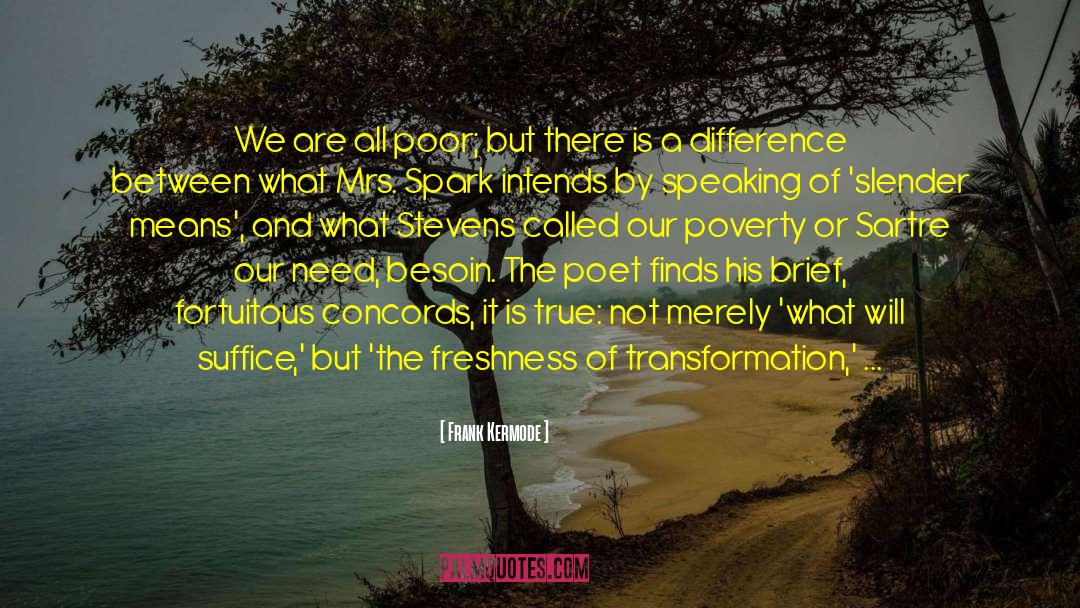
The great majority of interpretations of Apocalypse assume that the End is pretty near. Consequently the historical allegory is always having to be revised; time discredits it. And this is important. Apocalypse can be disconfirmed without being discredited. This is part of its extraordinary resilience. It can also absorb changing interests, rival apocalypses, such as the Sibylline writings. It is patient of change and of historiographical sophistications. It allows itself to be diffused, blended with other varieties of fiction--tragedy, for example, myths of Empire and of Decadence--and yet it can survive in very naïve forms. Probably the most sophisticated of us is capable at times of naïve reactions to the End.
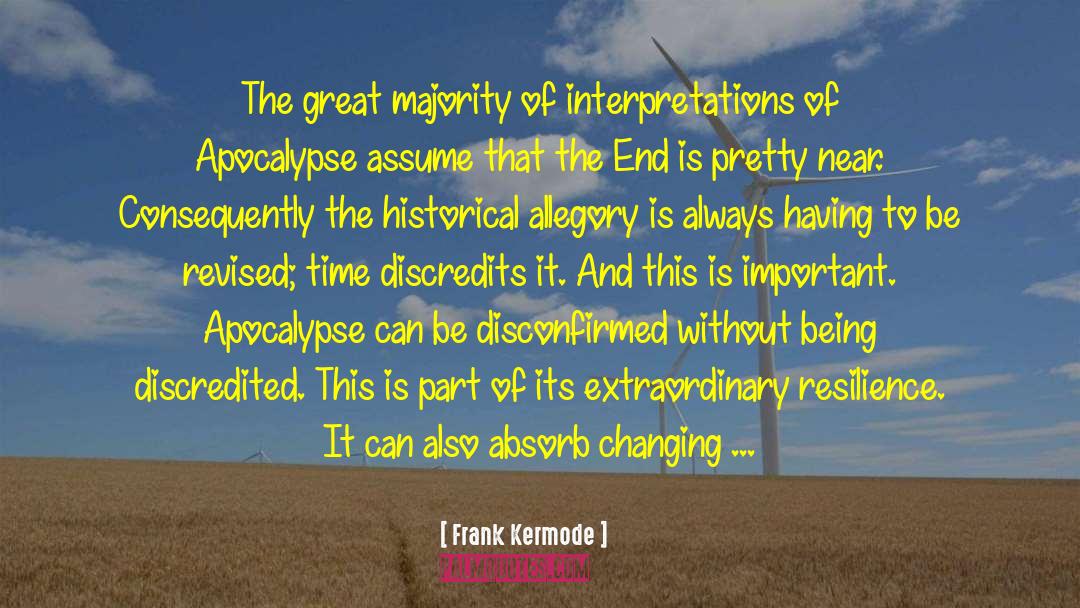
At some very low level, we all share certain fictions about time, and they testify to the continuity of what is called human nature, however conscious some, as against others, may become of the fictive quality of these fictions.
It seems to follow that we shall learn more concerning the sense-making paradigms, relative to time, from experimental psychologists than from scientists or philosophers, and more from St. Augustine than from Kant or Einstein because St. Augustine studies time as the soul's necessary self-extension before and after the critical moment upon which he reflects. We shall learn more from Piaget, from studies of such disorders as déjà vu, eidetic imagery, the Korsakoff syndrome, than from the learned investigators of time's arrow, or, on the other hand, from the mythic archetypes.
Let us take a very simple example, the ticking of a clock. We ask what it says: and we agree that it says tick-tock. By this fiction we humanize it, make it talk our language. Of course, it is we who provide the fictional difference between the two sounds; tick is our word for a physical beginning, tock our word for an end. We say they differ. What enables them to be different is a special kind of middle. We can perceive a duration only when it is organized. It can be shown by experiment that subjects who listen to rhythmic structures such as tick-tock, repeated identically, 'can reproduce the intervals within the structure accurately, but they cannot grasp s
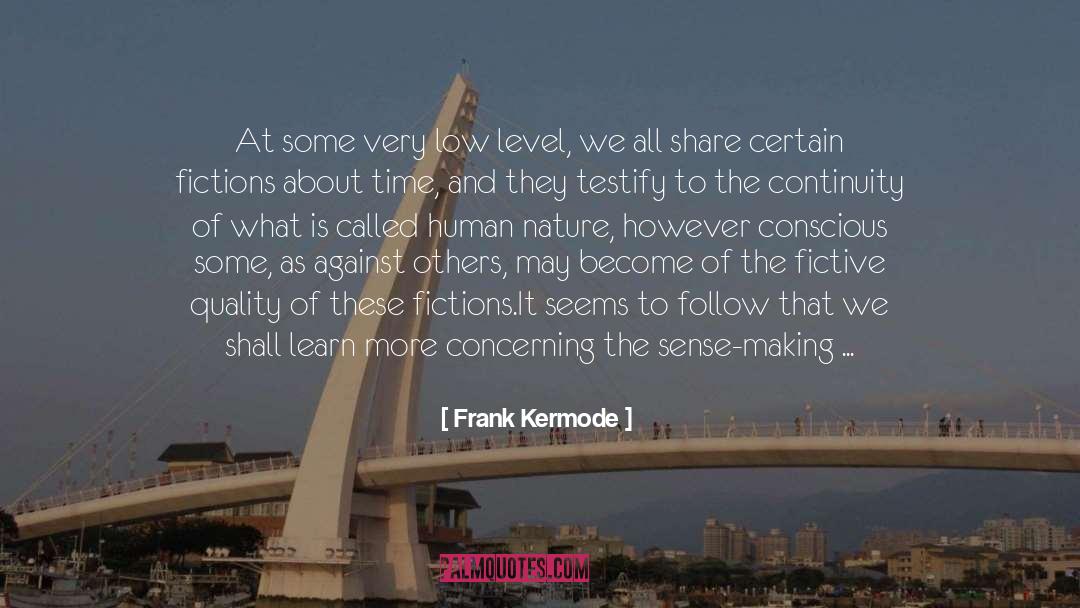
It is ourselves we encounter whenever we invent fictions.
